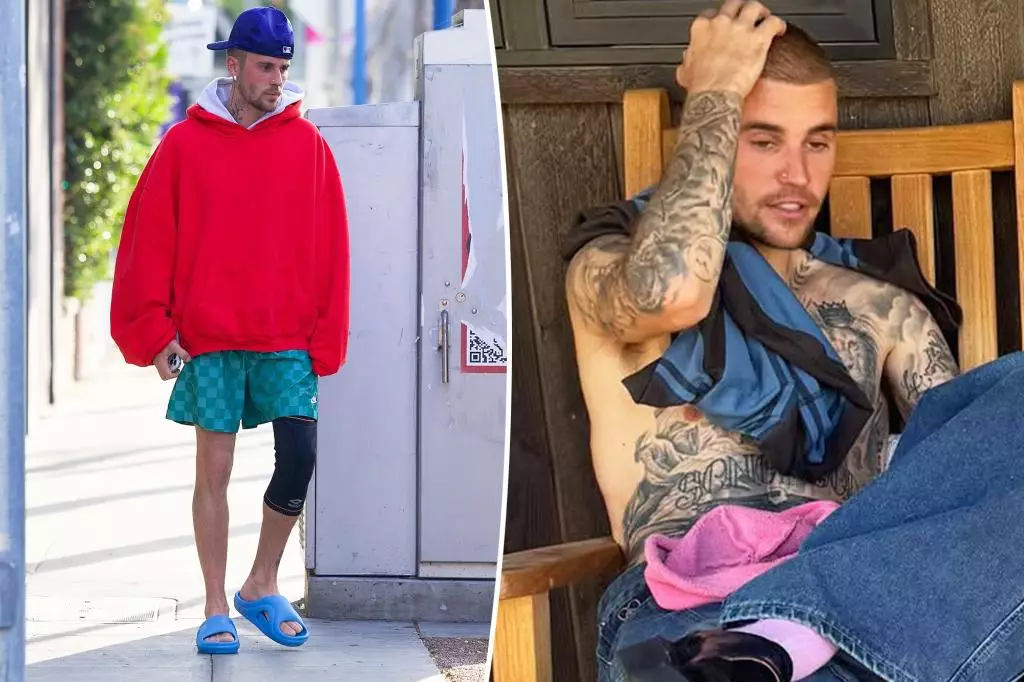On his recent visit to a West Hollywood spa, Justin Bieber made headlines once again, but this time, it was for a somewhat concerning reason. Photographed arriving at Voda Spa with a conspicuous black bandage on his left leg, Bieber’s physical discomfort raised eyebrows among his fans and the media alike. His fashion choices—a bright red hoodie and green checkerboard shorts, paired with blue slides and a baseball cap—suggested a casual, laid-back demeanor. Yet, behind this relaxed facade, a potent mystery lurked, leaving many to speculate about the nature of his injury and, more importantly, the emotional weight it might carry.
At 31, Justin is not just a pop star; he is a multifaceted individual navigating the complexities of fame, parenthood, and personal well-being. This injury, while physically visible, symbolizes deeper issues that might be affecting his mental health. As fans await clarity on the nature of this ailment, it prompts a deeper reflection on how physical injuries in celebrities often intertwine with their emotional states, a reality that demands scrutiny and empathy.
Public Scrutiny and Personal Turmoil
Bieber’s recent social media activities haven’t done him any favors. Recorded rants and casual drug use shared on platforms like Instagram have fueled public concern about his behavior. A string of summer photos showcasing tender moments with his infant son, Jack Blues, stands in stark contrast to other images showing the singer smoking a blunt. Such juxtaposition has led to outrage among those who worry about the environment in which Bieber is raising his child.
Many observers feel conflicted, appreciating the candid glimpses into his life while simultaneously critiquing what they perceive as reckless disregard for parental responsibilities. These concerns are amplified by the potential ramifications of the pop star’s choices on his relationship with his child and overall well-being. When a celebrity’s life becomes a spectacle, the line between their professional persona and personal wellbeing often blurs, inviting unsolicited opinions and judgments.
The Friendships and Support Networks: A Fragile Foundation
Bieber’s inner circle has reportedly expressed serious concerns about his mental health, invoking fears that the singer might be spiraling out of control. Former colleagues have painted a troubling picture of a man appearing increasingly lost amid the glitter and chaos of celebrity life. One former team member remarked, “It’s watching the embodiment of someone not living their purpose.” These observations underscore a critical issue: the importance of maintaining strong support networks as one navigates the pressures of fame.
The fear and concern expressed by those close to him beckon the question: who protects the protectors? This sense of vulnerability exists not just for Bieber but for many public figures who place themselves under the constant gaze of their audiences. The lack of boundaries creates a setting where erratic behavior is often tolerated, even encouraged, in fear of aggression from fans or industry outsiders. The result is a precarious balance where the true self often struggles to surface amid public expectations.
Media’s Role in Mental Health Narratives
Moreover, the media’s role in building or breaking narratives surrounding celebrity mental health cannot be underestimated. A rep for Bieber has publicly denounced speculation as harmful and misinformed, revealing an underlying issue in the way stories are constructed and consumed. The ramifications of such narratives can extend far beyond mere gossip; they can have real consequences on the mental health of the people involved.
It’s a double-edged sword: while public accountability can encourage positive change, sensationalized storytelling can exacerbate an already vulnerable situation. Thus, as the public shapes opinions about Bieber’s life choices, there is a pressing need for responsible journalism and a compassionate approach to reporting on a celebrity’s mental health battles.
In a world increasingly obsessed with social media portrayals and celebrity gossip, Justin Bieber challenges us to reevaluate how we engage with public figures. His leg injury may be a physical ailment, but it serves as a representation of broader mental health struggles facing those in the limelight. As he navigates both fame and fatherhood, it is our responsibility to extend empathy rather than judgment, recognizing that behind every headline lies a human being deserving of care and understanding.


Leave a Reply